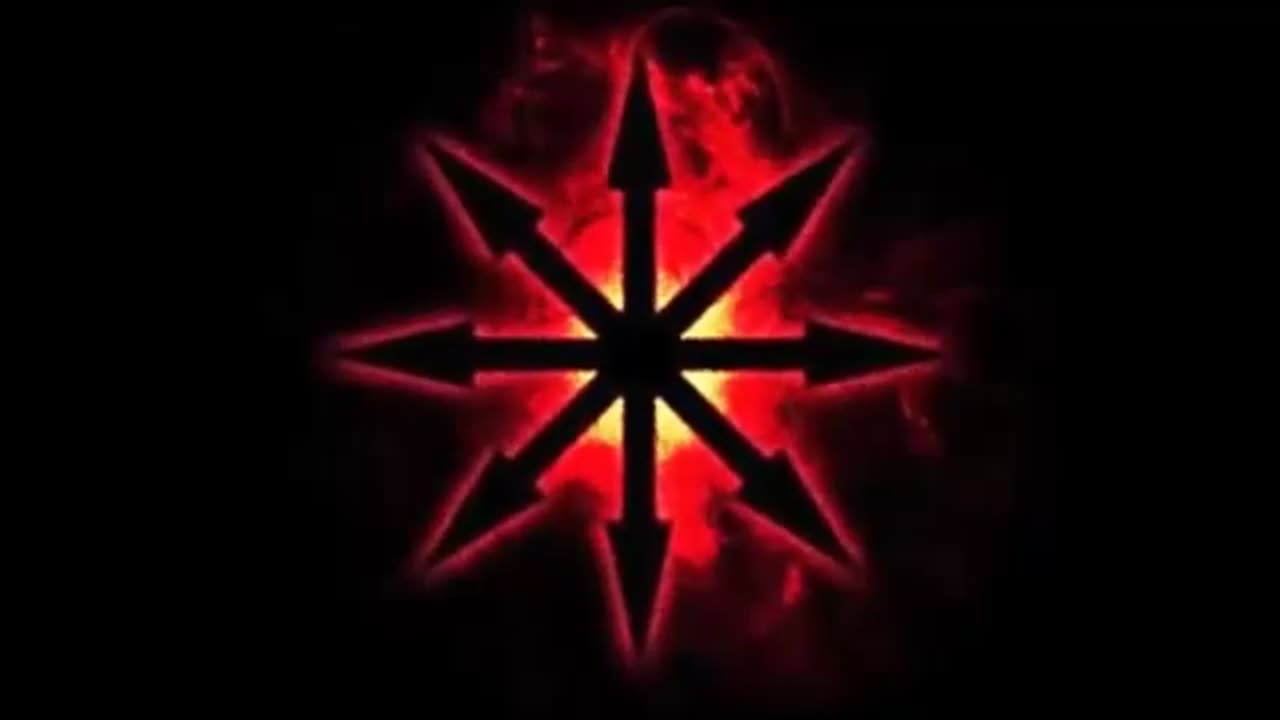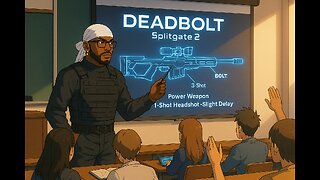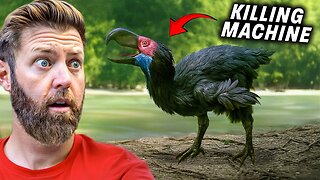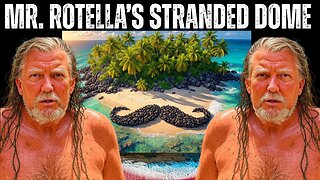Premium Only Content

Dugin's nazi misticism (Cristian Derosa)
https://www.estudosnacionais.com/35862/o-misticismo-nazi-de-aleksandr-dugin/
Aleksandr Dugin's Nazi mysticism
Russian version of pan-German occultism underlies the ideology of the main propagandist of the Russian regime in the world
by Cristian Derosa
In a report on Aleksandr Dugin's influence, the Rand Corporation goes so far as to say that the ideologue's ideas “are too complex to be adopted by a party”. It is unbelievable that they use this conclusion to argue that he would have no influence on Russian politics. This is because anyone who studies the subject knows that this only indicates that it encompasses mere politics.
This article is only about the occult part of Dugin. An analysis of its philosophical and geopolitical sources invariably also leads to relations with third-position radicalism, that is, fascism and Nazism as the matrix of an ideological construction that is both creative and dangerous.
This article will certainly be the target of Duguinists, who will accuse me of being “politically correct”, that is, seeing negative connotations in both occultism and Nazism. Or even, as I have been accused of, of being based on the Popperian dichotomy that distinguishes between open and closed societies, the supposed basis for demonizing fascism and communism. But it was Dugin and not Popper, who brought together precisely everything that is totalitarian against human freedom, seen as “modern Western moral degradation”.
Dugin has been involved in circles of intellectuals and literary, poetic and occult groups since the 1980s, responsible for the integration between Russian and European esotericists. And we would only have to read False Dawn, by Lee Penn, to understand the strength that these orientalist movements have in the conduct of world politics, especially among globalists, which already relativizes Dugin's supposed opposition to globalism, directing his hatred, in true, for the physical, geographic West.
But for some it is clear that Russia was wonderfully protected from this terrible occult force. This trivial error in analysis could cost dearly conservatives and the Brazilian right who easily give in to the narrative of “spiritual and Christian rebirth” of Russia against Ukrainian neo-Nazis. Behind all this rhetoric, there is a real threat of the return of ideologies based on occult and neo-pagan beliefs. Removing the pseudo-scientific narratives of Nazism, with which racism was justified, all that remains is the mystical basis that ultimately guided the entire doctrine of German supremacy. In the Duguinist version of traditionalism, Russians are “virtually initiated” and the Russian Orthodox Church is essentially “initiatic.” In this text we will see some elements that explain how Dugin reached this conclusion of Russian spiritual supremacy.
In the book The Fourth Political Theory, Dugin says that it is necessary to move away from anti-communist and anti-fascist prejudices, which he considers as a kind of submission to “political correctness”. An in-depth analysis of the sources that formed his current ideology reveals the reason for this simple appeal made by him.
In the 90s, Dugin helped create the National Bolshevik Party, which united communist and Nazi symbolism in a political approach that he considers, today, as a first “experiment” before the formation of current neo-Eurasianism and its fourth theory. However, what drove this dangerous ideological mix remains alive and increasingly relevant.
In 1997, Eduard Limonov gave a talk in which he mentioned some of what he had been learning from his ideologue Dugin. The lecture was titled “The Philosophical Russian” and was given to members of the then National Bolshevik Party. Dugin would have said that it would be necessary to create a “new type of man” through laborious self-improvement. It was the “Russian philosopher”, through whom, only then would it be possible to start a revolution. This thesis of Dugin's “new man” does not have the Christian connotation that can be imagined, but it is part of a doctrine later very well elaborated in the book Fundamentals of Geopolitics, Dugin's most important book to date, with four editions from 1997 to 2000.
In fact, the work became so influential that its second edition included an afterword by Lieutenant General Nikolai Klokotov, former head of the Russian Armed Forces General Staff Academy. Building on the legacy of such imperialist and Nazi geopolitical theorists as Alfred Mahan, Friedrich Ratzel, Halford Mackinder, Karl Haushofer, and Nicholas Spykman, Dugin explores the question of geopolitics. But if Limonov highlighted the “self-perfection” aspect of transition to the “new type of humanity,” Dugin’s book outlined a more pragmatic and strategic political and ideological vision that would affect the entire world. This vision is based on the paligenetic idea, that is, the study of rescuing the essence of a people, something that had only been done before by the occultists who influenced Nazi doctrine. This study of Dugin is due to his entire training alongside minds greatly influenced by these ideas, in addition to the Russian environment at the time, marked by the end of Soviet repression and the consequent ebullition of occultist movements.
Before people say that Dugin no longer influences the Kremlin's foreign policy, it is necessary to remember Ivan Ilyn, cited and recommended by Putin himself to the military command as mandatory reading. As I recently explained on the Observadores podcast, Ilyn was anti-communist and anti-Bolshevik and was exiled by the communists to Germany, where he was fascinated and convinced of the superiority of German national socialism as an alternative to Russia. Therefore, the Nazi sources recovered by Dugin have a purpose much more associated with Putin than his admirers would like to admit. Let's see.
“Soviet occulture” as the basis of Russia’s “spiritual renaissance”
In the late 1970s and early 1980s, the Soviet Union experienced an environment of popularization of the occult through official means, summarized by Christopher Partridge in the term “Soviet oculture”. The proliferation of esoteric circles through occultism in literature, combined with the growing institutionalization of parapsychology in the scientific departments of Soviet intelligence were ingredients for the boiling of this phenomenon. This climate was defined by the combination of groups that sought roots in ancient Russian esotericism with new, postmodern tendencies of subversion.
According to Pavel Nosachev, the movements that saw the emergence of figures like Yuri Mamleev and later Dugin were marked by three common characteristics:
1) the option for “left-hand path” esotericism as a form of revolt against the official Soviet system;
2) the search to relate esoteric practices with traditional religions, especially the Russian Orthodox Church; It is
3) the predisposition towards radical syncretism.
This climate brought the call for a bohemian and clandestine rebellion, diagnosed as schizophrenic by the regime. Often this radical madness was marked by experiments in altered states of consciousness in what was seen as “radical metaphysics”, represented mainly by the Yuzhinsky Circle.
There is no way to understand Dugin's thoughts without knowing something about what the Yuzhinsky Circle produced and studied, of which he was part of in the 1980s in Moscow's intellectual underground. Even today, he considers the circle to be the place where he met and learned from his “great masters”.
In an interview given in 2006, Dugin says that his ideological, metaphysical and political formation was already fully defined around 1981, which will spare us from possible considerations that the ideologist has changed in his references and esoteric and ideological sources, regarding the which we will talk about here.
“In 1981-82 I was already a complete philosopher with my own intellectual agenda, with my own metaphysics and ideology,” he wrote in a short autobiography that can only be found through the web archive. “I perceived myself as a rebel of Tradition in the desert of modernity, a man of the metaphysical underworld, preparing an apocalyptic revenge – hopeless and, at the same time, inevitable,” wrote Dugin.
The Yuzhinsky Circle was especially influential in Dugin's early intellectual life and provides us with important clues about the essential ingredients for the formation of his current ideas.
This underground circle was especially influential in the “Moscow boheme” shaping underground intellectual life from the 1960s to the 1980s. The circle believed in the method of responding to the Soviet regime without an opposing political ideology, but through a metaphysics and the search for another level or reality. This esoteric quest contributed to the introduction of Nazi occultism into the Soviet and Russian environments. They sought to go beyond the political discourse about Russia's unique and specific path and simply add a mystical vision that sheltered the path the country could take. In an era marked by profound official atheism, the circle may have offered a spiritual relief.
Two occult currents
According to a historical and philosophical survey by Jafe Arnold, from the Center for the History of Hermetic Philosophy of the Religious Studies department at the University of Amsterdam, the Yuzhinsky Circle brought together the two main occult currents most active in the world up to that time: Perennialist Traditionalism by René Guenón and the tradition of Völkish occultism or Wotanism, created by Guido von List, also considering the contributions of his followers. The study of the origins of these two branches of European occult philosophies takes us into rather dark realms and allows us to understand the formation of Dugin's occult ideas as pieces that fit into his current ideological puzzle. Let's look at each of them.
Traditionalism
The first branch, centered on the person and work of the esoteric Muslim Sufi René Guénon (1886-1951), delimited the concepts of traditional doctrines centered on the idea of “Primordial Tradition”. According to Arnold, the traditionalist doctrine can be exposed in three fundamental hypotheses:
1. The “Primordial Tradition” and Perennial as a non-human and transcendent origin “of which the various historical and metaphysical traditions are a mere apparent surface”;
2. Western modernity is the final “dark ages” (called “Kali Yuga”), within the current “cosmic cycle” due to the opposition and inversion character of the Betrayal. For Guenón “never has humanity been as seriously alienated as it is today”; It is
3. Tradition can and should be recovered by an “intellectual elite” through “initiation” and “focus on the common denominators of the various religious and metaphysical traditions”.
This last point Guénon considers his own definition of “esotericism”, which he considered to be the deepest, most hidden and superior level of a doctrine or organization. This hidden side coexists and interacts in a dialectical way with the “exoteric”, external and open side of this religion in its ritual forms. In Guénon's view, the “esoteric” dimension, which has an initiatory character, corresponds to the real “traditional principles” derived from the Primordial Tradition and, therefore, is related to “initiation” and the perennial metaphysics underlying all traditions. It is in this sense that Dugin refers to the word Tradition, that is, only to that which connects religions to the myth of the Primordial Tradition.
Although Dugin's critics accuse him of a certain break with Guenonian traditionalism when choosing the German Martin Heidegger as his philosophical godfather, the accusation goes in the sense that the Russian may have changed direction from the so-called more “noble” or “superior” esoteric paths. of guenonism through a counter-initiatic version or, in occultist terms, the “left hand path”, an aspect that seeks enlightenment through destruction (of the world, the body, rules, morals) instead of the path of ascetic practice of the Gnostic traditionalists of the “right hand path” or “white lodge”. Dugin's affiliation with Guenonian traditionalism, however, is only doubtful today, as there is no doubt, as Arnold shows, about how much this esoteric current influenced his early works and activities.
Guenonian traditionalism is without a doubt the main source that emerged in Dugin's early works, in addition to his political activities. From traditionalism, the ideologist today justifies the appeal to traditional religions, the defense of Orthodox Russia and all religious movements that have within them a kind of tradition of their own, which would be theoretically justified by, in some way, directing themselves to a Tradition Primordial, to a single body. This was the means found to escape relativist conclusions in order to defend the Multipolar World, in which each people, region and tradition has its “own truth”.
Völkish occultism
The second occult current of great influence on the Yuzhinsky Circle, according to Arnold, and which also played a role in the formation of Duguinian ideas, is the occult branch initiated by Guido von List, the so-called Wotanism or Völkish occultism.
At the end of the 19th century, the Austrian occultist and novelist Guido von List created a neo-pagan movement that he considered a rescue of the religion of the ancient Germanic race in defense of a cultural renaissance in its name. Guido is considered one of the main influencers of Nazism.
Arnold recalls that, like traditionalists, völkisch occultists rejected the modern world as a state of degradation, defending an ancient tradition of wisdom centered on the myth of a “protocontinent” lost to the far north of the Earth, center of a “Golden Age”. ”, whose doctrines would have survived and could be reconstructed by an intellectual elite knowledgeable of the “initiatory” elements of religion, mythological, esoteric and occult sources. Despite the similarity with Guenonian traditionalism, völkisch occultists focused their doctrine on a cosmic mission delegated to a historical “subject”, the Ario-Germanic Volk (people) or Aryan race. This sacred mission was seen as an existential conflict with other spiritual and biological races, particularly the Slavs and Jews.
From this perspective, List created, in the 1890s, a vision of the ancient Wotan cult as a proposal for a “national religion” or “hidden and secret national heritage” of the Germanic peoples. At this time, List was deeply influenced by the theosophy of Helena Petrovna Blavatsky, who brought the notion of racial evolution and techniques of mystical visions that he interpreted as coming from a remote past. During a period in which he became temporarily blind, List says he had revelations about “the secret of the Norse runes” through which he would have learned to decipher an ancestral language, from which he would then have understood an entire ritual liturgy of the ancient Germanic peoples and their connection with remaining folklore, popular etymology and the combination with other occult currents such as Kabbalah, astrology and Freemasonry. Claiming to be inspired by these revelations, List proposed the existence of an Arian theocracy that would include elements of an exoteric doctrine in addition to the esoteric, that is, a new popular religion that he called Armanism.
The final conclusion of his studies and revelations led him to commit to the project of a German Reich that would restore humanity through an apocalyptic event of eschatological proportions (could it be the Holocaust?). Everything would converge towards an “Armanist millennium” and to prepare the world for this, List created the Hoher Armanen-Orden, in 1911, with the declared objective of indoctrinating and ritualizing the reconstruction of this primordial Aryan religion that he called “ariosophy”. To purify modern society, which was degenerated, List therefore prophesied the emergence of the Pan-German Empire, which would last a thousand years and have Wotanism as its official religion. He believed that this would happen already in the First World War through the victory of the central powers, or central empires, formed by Germany, Austria-Hungary, the Ottoman Empire and Bulgaria, linked to the Triple Alliance. But List died on a visit to Berlin in 1919.
According to Arnold, these terms and models, as well as the spiritual search for the revelation of a spiritual mission linked to a people, were especially present at the end of the Yuzhinsky Circle, which is why they appear in Dugin's early works.
So far there seems to be nothing Christian, except the traditionalist appeal according to which a traditional exoteric religion, such as Christianity, would represent, in essence, an imperfect, but necessary, expression of the Primordial Tradition. From the point of view of Wotanism, however, the inspiration is clearly neo-pagan and professedly anti-Christian. However, it was with one of List's disciples that Christian elements joined this whole miscellany.
This is Jörg Lanz von Liebenfels, a former Cistercian monk expelled from the seminary due to his bad conduct, and who was fascinated by List's work, to the point of founding the Guido Von List Society, the List Society. Liebenfels published a book entitled Theozoology, in which he defended the sterilization of people belonging to “inferior races”, the submission of women to Aryan men and the “copulation of single women willing to be mothers with blond, blue-eyed Aryan men in convents of procreation".
For Liebenfels, Eve became sexually involved with the devil himself, giving birth to “inferior races,” which he believes explains the attraction of poor German women to rich dark-skinned men such as “Jews of sub-Mediterranean appearance and non-Nordic ” which he considered as “almost transient apes”, in a clearly evolutionary and racist perspective. This attraction, for him, represented the decadence that would lead to the “parasitism” of these women, a characteristic he associated with the tertiary sector of the economy, such as the financial sector of bankers, etc., seen as typical of inferior races. Liebenfels believed that this “problem” should be solved by “racial demixing”, an ideal of purification that he deeply related to Christianity, a way for inferior peoples to get closer to divinity.
It was from the reading and influence of List and Liebenfels that a third name appeared: the occultist Rudolf von Sebottendorff, a student of Sufi, Rosicrucianism, Freemasonry, Kabbalah and astrology, as well as alchemy, was after being introduced to the work of List and Liebenfels who decided to incorporate them, in 1918, into the Thule Society, a movement that became the main disseminator of the new proposal for an Aryan religion. All of this made possible the widespread adoption of Aryan symbolism through official German channels, specifically the swastika and the eagle, references to Northern Urheimat, the Nordic holy land, and Thule, signifying the rescue of German antiquity.
Thus, Jafe Arnold concludes that although the völkisch occult current has changed over time, its authors have in common the search for unification and rescue of a “primordial Aryan tradition”. “All of these authors appear in Dugin's early esoteric grammatology and thus appear to have represented prototypical precedents for what we will see to be Dugin's own formulation of an eschatological spiritual identity and mission for Russia,” Arnold writes.
At least in this last current, we saw the clear influence of Nazi mysticism as Dugin's intellectual formation. But the other, the traditionalist line that believes in the Primordial Tradition, also leaves nothing to be desired in this regard, at least in the sense that Dugin makes of it.
In an article on counterinitiation, Dugin writes:
Now a few words about the Primordial Tradition. From our point of view, the contours of this Tradition were outlined with astonishing clarity in the works of the German professor Herman Wirth, whose review of the book Guénon published in Études Traditionnelles. According to Wirth, all existing mythological plots, symbols, religious dogmas and rituals, and furthermore all human languages and alphabets, evolved from a single proto-calendar form: the Sacred Circle, accompanied by an arrangement of proto-rune signs. This protoform was a description of natural phenomena observed by humanity at the North Pole on the ancient, vanished continent of Hyperborea (or Arktogaa). Thus, from an abstract concept, the Primordial Tradition became a tangible and concrete reality of a paradigm whose main contours were revealed in an extremely convincing and voluminous way by Herman Wirth.
The “astonishing clarity” seen by Dugin in Herman Wirth’s work actually reveals something more about his sources. Dugin highly praises Wirth's work. But who was he? As a student of symbols and occult history, Wirth published a book on the “prehistory of the Atlantic Nordic race” that became the main book of the Völkish Circle, a 19th-century movement that gave rise to Nazism and is often related to the “Konservative Revolution.” ”. Wirth is considered by some to be the founder and inspirer of Ahnenerbe, a type of think tank for the dissemination of Nazi ideas in Germany, created in 1935, and was chaired by Fredrich Himmler. The Nazis were deeply interested in Wirth's studies of the origins of the continents and the sacred lands of Hyperborea and Aktogaa, evidence of the closeness of the Norse to the original races (which many Nazi occultists believed to be extraterrestrials).
Wirth supported and inspired expeditions to the Arctic in search of sacred lands that he did not believe to be mythical, but real and concrete. He was always sponsored by Himmler until he was removed. In 1979, while still alive, he was interviewed by Chilean neo-Nazi Miguel Serrano, also a mythology student and who believed in a “second coming” of Hitler. Serrano says that Wirth spoke of an important anti-Semitic work of his having been stolen, which was later also mentioned by Dugin.
But let's look at what Dugin says about Herman Wirth.
“Like all heroes in dark times, on an external level he met defeat, but on a spiritual level he rose to Triumph and Victory. The darker the night, the closer the golden rays of the dawn, the rising of the Aurora. Among us there lived a man who revealed the great secrets, who deciphered the secret of the past, a man who reconstructed the entire language of the Great Primordial Tradition, but who was virtually unknown, unnoticed, misunderstood and unread. Despite Julius Evola having called Wirt one of his three teachers (along with Réne Guénon and Guido de Giorgio), and also despite Guénon having dedicated a large part of his studies on the cycle and symbolisms of the human races to Wirt, the Today's traditionalists completely ignore this great author. It's so strange that it raises suspicions. Are the chosen ones really in the shadows and covered by the midnight cloak? Does not his recklessness and desire to maintain a fanciful orthodoxy expose his own parody and fraud?
At another point in the text, the rejection of Wirth is credited by Dugin to “political correctness”. In fact, it is not at all nice to rely on studies that point to Aryan racial superiority through the apparently simple interest in runes or hypothetical sacred lands.
In addition to Dugin and his followers, Wirth's work strongly influenced Nazi occultism through the Völkisch movement, most prominently inspiring the Holocaust itself through its motto “blood and soil.” The movement did not have a homogeneous set of beliefs, but a kind of subculture that opposed the sociocultural changes of modernity. The common idea that identified them, however, was the notion of national rebirth inspired by Germanic traditions that had been “reconstructed” on a romantic basis by adherents of 19th century philosophy in Germany. This renaissance would have been achieved both by the “Germanization” of Christianity, considered an Abrahamic, Semitic religion, which spread to Europe from the Middle East, therefore inferior. They rejected whatever Christian heritage existed in Germany and supported pre-Christian Germanic paganism.
In his article on Wirth's contribution, Dugin ends as follows:
“But Herman Wirth’s works were not lost. The Northern Light burns in our hearts. The Winter Queen snatches our souls and enchants them with the magic of polar sleep. There, in the arctic night, in Arctogaia, we, under the initiatory name of Kai – the resurrected one, the ascending one, the one who belongs to the spring of the Divine Year – gathered together the pendants of the magic word, EWIGKEIT, the favorite word of the German professor Herman Wirt.”
Masonic origin of the Circle
The name of the Yuzhinski Circle refers to the Georgian prince Alexander Sumbatov, who used the pseudonym Yuzhin. He dominated Russian theater at the turn of the century and was a Freemason, initiated into the “Renaissance” Masonic lodge of the Grand Orient of France in Moscow. This store would have stood out for creating a network of other stores and circles in which meetings were organized in the spring after the 1905 Revolution. The Renaissance circles brought together political radicals, the rich and nobles of the time, uniting political ideas with an interest in esoteric studies in a great integration between members of stores across Europe. “Throughout the period of the turbulent series of events that culminated in the collapse of the Russian Empire, many of the members of this milieu found themselves at the pinnacle of politics and state structure, often precisely thanks to their Masonic connections,” says Arnold.
Active in politics, Yuzhin-Sumbatov was promoted to director of the Moscow Theater in the same year as his initiation into the Renaissance lodge. His international fame and Masonic contacts brought him closer to the Soviet People's Commissar for Education, a kind of minister, Anatoly Lunacharsky, who was also a practitioner of theosophy and occultist with ideas of inserting occultism into the theater of the USSR, to simply recruit occultists in a collaboration with the Soviet state. Yuzhin's occult and mystical side contrasts with his public stance. In his official biography, Yuzhin was a realistic man, a lover of progress and an enemy of mysticism. But behind the curtains of communist theater, he defended a ritual theater through the adoption of esotericisms. In fact, he was one of the most important channels for transmitting esoteric sources and content between the Soviet Union and France, as he lived between the two countries. This integration of occultism was, according to Arnold, decisive for the development of all those who participated in the circle in the following decades, which can include the work of Renê Guenón, just to mention the most obvious source.
One of the most influential members of the circle and one of Dugin's teachers was the novelist and composer Yuri Mamleev, who believed in the exotic thesis that Russian Orthodox Christianity had a spiritual identity in common with Hinduism, having dedicated part of his life to bringing together the Russian and Indian religious traditions as part of a project to build a “Slavic esotericism”. He believed in a Gnostic perspective of the world in which the physical aspect of the world is illusory and evil. His main influences were theosophists Rudolf Steiner and Helena Blavatsky. In his last work, Eternal Russia, Mamleev emphasized Steiner as a visionary of Russia's unique spiritual mission.
Dugin owes much of his training to Mamleev, as well as his entire period in the Circle. The union between guenonism and völkisch occultism, as we will see, appears clearly in its current ideological physiognomy. From a deeply Guenonian base, Dugin began his work spreading the thesis that Russian Orthodox Christianity is authentically initiatory and the Russian people have this initiatory tendency. For him, the Russian people already have a “virtual initiation”, which is why it will be from a Russian elite that the salvation of humanity will come. “If there is still the possibility of salvation for our ‘counter-initiatic’ civilization, then wouldn’t Orthodox ‘initiatic’ Russia be the best place for this ascension?” says Dugin in Russian Orthodoxy and Initiation. He states that in possession of this “virtual initiation”, as proof of the Russian spiritual mission, this enlightened Russian elite will “launch the 'nation of the red beast' into the spiritual heavens of the Holy Trinity like Christ himself, freeing Old Adam from the traps of hell". Based on what we have seen so far about the unorthodox mix between traditionalism and Wotanism, we can imagine that Dugin's idea of Christ, the Holy Trinity and the Heavens may be quite different from that found in the catechisms. It is not necessary to think much to understand that he adapts the Guenonian meaning of “initiation” from a perspective identical to the messianic discourses of völkisch occultism. In other words, what is initiation if not superiority over the uninitiated? Wouldn't the Aryan superiority of the Germanic Wotanists be the same as a “virtual initiation” given by the Eternal to a people simply because of their Germanic descent? In place of race, Dugin inserts Russian soil, the “Russianness” that grants “initiation” as long as it is assumed in adherence to the true Tradition.
Another very important figure in Dugin's formation, having been his main initiator in the Circle, was the Muslim Geydar Dzhahidovich Dzhemal, mainly responsible for the circle's contact with Guenón's work. His focus on Islamic traditionalism, however, led him down a path very similar to that of the völkisch occultists, with whom he was also very influential. In his work entitled Orientation: North, Dzhemal concludes his search for the “pole of the impossible”, in analogy to the search for the self, as what he considers the “pivot” that would “transcend all metaphysical equations” as the “eternal pole” for the north. “He who goes to the North does not fear the night. Because in the northern sky there is no light”, he wrote. His conclusion was not at all far from the controversies that circulated among occultists of the time who were based on Guenón, after all, the French Sufi frequently insisted that the Primordial Tradition could only be Nordic, which would mean being polar. They said this based on Vedic texts and other sacred books.
This Norse tradition was called Hyperborea, which meant “beyond the Boreas (northern wind)”, representing the “beginning of the cosmic cycle”, which, according to Guenón, could not be confused with the Atlantic or the “Atlantean tradition”, this is considered a degradation of the Hyperborean tradition. Worse than that: the Atlantean tradition is associated with terrible and dangerous “counter-initiatic” doctrines. The Atlantic is seen as the representation of maritime lands and, therefore, the tradition of maritime dominance, predominantly commercial and traveling. These ideas were deeply influential for other occultists and polemicists such as Julius Évola, who was also highly regarded by the members of Yuzhinski, who based their spiritual racialism that concluded on the superiority of the central European region in relation to the peoples of the Mediterranean, Jews and others. In addition to Guenón, one of the main sources for these beliefs in Évola was Herman Wirth.
Finally, Dzhemal also ended up discovering and becoming enchanted with the sources of Nazi mysticism through the work of Armin Mohler (1920-2003) on the Konservative Revolution in Germany, which introduced him to names such as List, Liebenfels, Sebottendorff and Wirth.
It is from this metaphysics, a source in common with Nazism, that Dugin will format his geopolitics, centered on the north, on the earthly powers as a representation of the Hyperborean tradition, against the terrible and counter-initiatic doctrines of Atlanticism, ideologically incarnated today under the name of globalism, but which, deep down, represent places in space, lands, seas and peoples against which war seems to be an eschatological and therefore inevitable event, a self-fulfilling prophecy.
-
 20:48
20:48
Stephen Gardner
21 hours ago🚨You WON'T BELIEVE what just happened to Trump & George Soros!
62.4K575 -
 LIVE
LIVE
IcyFPS
2 hours agoFathers Day Splitgate BR w/ Arrowthorn! Lets go!!
139 watching -
 16:54
16:54
Forrest Galante
9 hours ago6 Animals You'll Be Glad Are Extinct
43.9K53 -
 LIVE
LIVE
HaywireMD
2 hours agoSubdaze Sermon - FATHERS DAY SPECIAL - New Dual PC Setup - Onyx Ranked Arena MM / VIEWERS LIKE YOU
47 watching -
 LIVE
LIVE
Lofi Girl
2 years agolofi hip hop radio 📚 - beats to relax/study to
756 watching -
 LIVE
LIVE
MSFT__kiLRoy
1 hour agoBorderlands 3 - Atlas Zane (Pt. 5) \\ Tracking Down Troy
48 watching -
 36:15
36:15
Athlete & Artist Show
1 day ago $2.15 earnedOilers In 6?, Where Will Marner Go?, Who Do The Hawks Draft?
36.6K2 -
 LIVE
LIVE
Rotella Games
4 hours agoRumble Island Ambassador | Day 8
95 watching -
 LIVE
LIVE
Sm0k3m
1 hour agoHappy Father's Day
37 watching -
 2:31:16
2:31:16
Sgt Wilky Plays
5 hours agoFathers day coffee and Karting
36.7K4